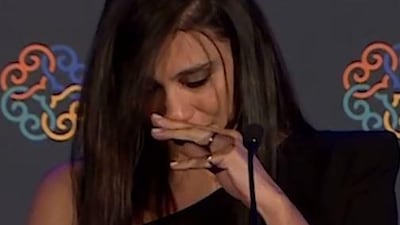Lebanese filmmaker and actress Nadine Labaki has called on Lebanese people living abroad to go back to their home country.
"Our Lebanon needs you," said Labaki while holding back tears during her acceptance speech for the Issam Fares Award for Excellence by the Middle East Institute in Washington, D.C. last week.
"Lebanon needs you physically, with your knowledge, your education, your energy, your talent, your goodwill. Come back home with me for a day or a weekend. Come spend Christmas. Let's start the mission of turning Beirut into the most festive city in the world this coming Christmas," she told the audience.

Labaki has taken part in the demonstrations that have swept the Lebanese capital and other parts of the country for the past month.
"I have never seen so much hope, so many smiles, so many debates, so much art, so many brilliant ideas and minds, so much dancing and chanting, so much strength, so much resilience, so much talent, so much sense of belonging, so much unity, than in the past 28 days," she said. "This revolution unraveled our potential."
The filmmaker received the award from the institute for her film Capernaum, which gave Labaki her first Oscar nomination and made her the first Lebanese female filmmaker to ever be nominated for an Oscar. It also led to her becoming the first female Arab director to win a major prize in competition at Cannes.
The film, which tells an emotional story of the lives of Lebanon's forgotten street kids, sheds a light on social issues that need to be addressed. On making the film, Labaki always said she felt it was her duty to make it. "It was my own little revolution."
____________
Read more
‘Capernaum’ gave her worldwide recognition, so what's next for Nadine Labaki?
Nadine Labaki gives impassioned speech in Geneva to raise plight of stateless people
Nine new Arab film makers join Oscars Academy
____________


